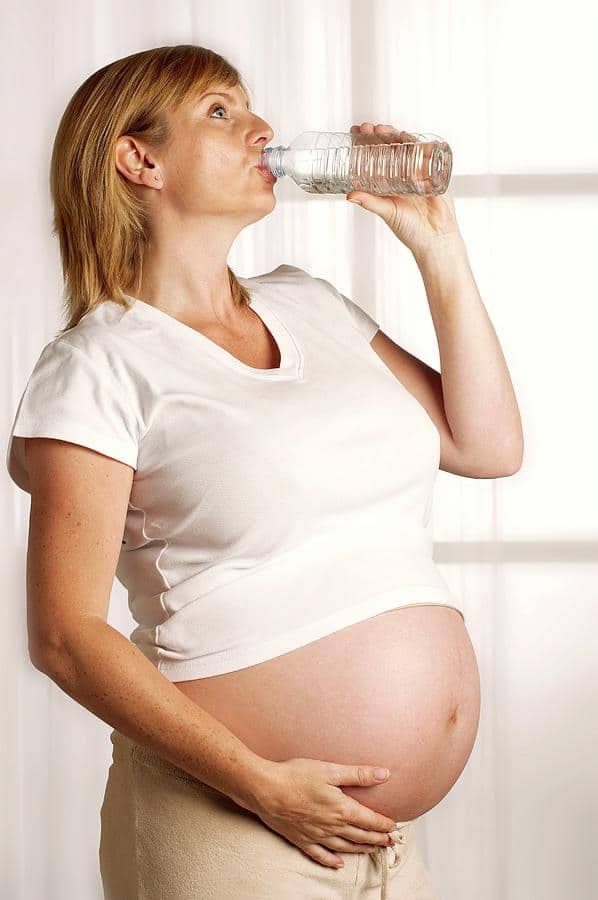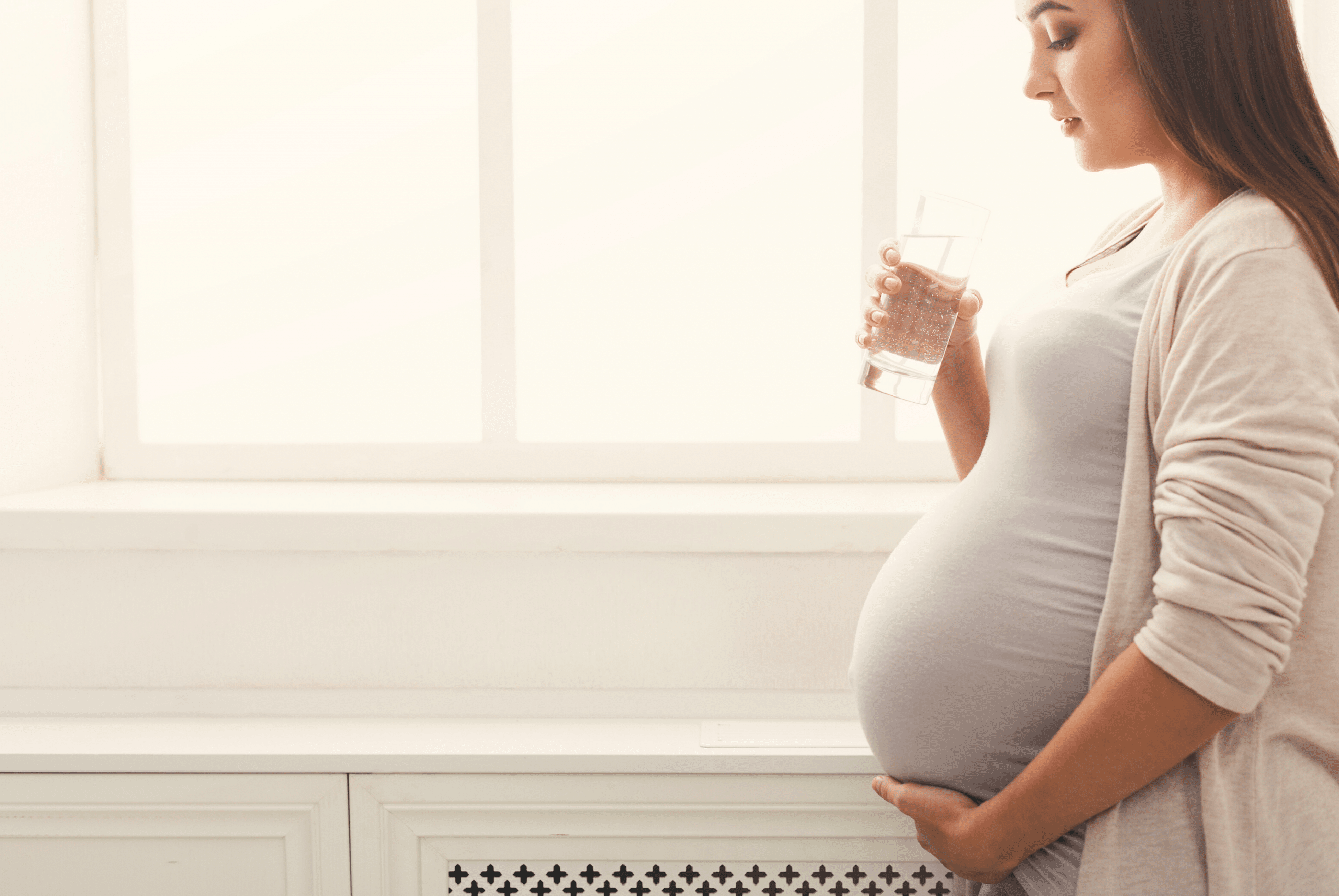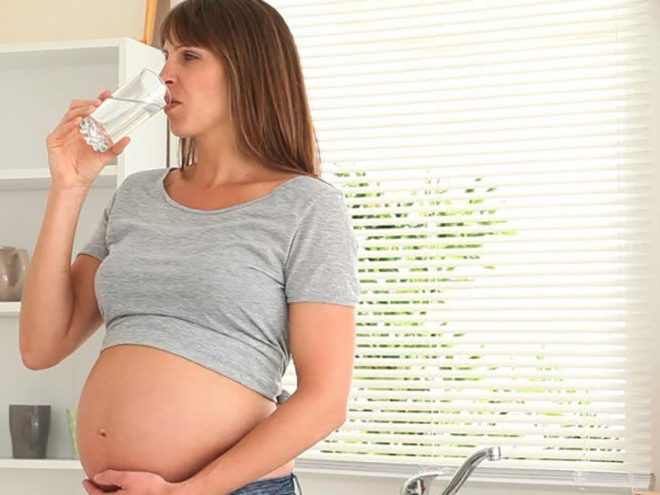Congratulations! You’re pregnant! You’ve heard that you should be drinking more water, but how much water should a pregnant woman drink?
Simply put, a pregnant (or breastfeeding) woman needs more water than the average person. Your body needs to produce extra blood, form amniotic fluid, enhance digestion, build new tissue, carry nutrients, and flush out wastes and toxins—it needs enough water to efficiently perform all those functions.
This is a quick and easy guide to help you figure out how much water you should be drinking, useful tips to help you drink more water, the benefits of staying hydrated during your pregnancy, and signs of dehydration.
How Much Water Should A Pregnant Woman Drink
 According to the Institute of Medicine, a pregnant woman should drink 10-12 8-ounce glasses of water per day. That’s just over half a gallon, or 2.3 liters of water per day. You’ll be able to tell that you’re drinking enough water if you are going to the bathroom frequently, and your urine is pale or colorless.
According to the Institute of Medicine, a pregnant woman should drink 10-12 8-ounce glasses of water per day. That’s just over half a gallon, or 2.3 liters of water per day. You’ll be able to tell that you’re drinking enough water if you are going to the bathroom frequently, and your urine is pale or colorless.
If you live in a low humidity region (above 1,500 meters / or roughly 4,900 feet), you are likely to lose more water than usual through sweat and respiration. If you are pregnant and live in a low humidity region, staying hydrated is even more essential.
Here’s a guideline of how much water you should be drinking per trimester.
Your First Trimester
If you are suffering from morning sickness, you’re probably finding it hard to keep anything down. Nonetheless, try to monitor your water intake to make sure you aren’t losing more water than you’re drinking.
Second Trimester
According to the American College of Obstetricians and Gynecologists (ACOG), you should be increasing your calorie intake by an extra 340 calories per day when you enter the second trimester. If you are drinking 1–1.5 ml of water for each calorie consumed, you will need to add another 340 ml/ 11.5 oz of water to your diet.
Third Trimester
By the third trimester, your caloric intake should increase to 450 calories more than the normal daily recommendation. Because you’re eating more, you would therefore need to drink more water as well.
The Benefits Of Drinking Enough Water During Your Pregnancy
Staying hydrated will:
- Improve your energy levels;
- Keep you cooler;
- Reduce swelling;
- Decrease constipation, (constipation can lead to hemorrhoids);
- Soften your skin;
- Decrease your risk of urinary tract infections;
- Decrease your risk of preterm labor;

Helpful Tips To Staying Hydrated During Your Pregnancy
If you have a hard time staying hydrated, here are a few things you can try to help you stay on track:
- Listen to your body and drink water often—you should rarely feel thirsty.
- Track your water intake. It’s way easier to track how much water you’re drinking if you have your own water bottle on hand, all the time.
- Infuse your water with flavor. Cut up some fruit and add it to your water. Some great ideas include lemons, limes, cucumber, or berries. Fresh mint also offers a great taste to water.
- Increase your fruit and veggie intake—they have water, too!
- Avoid caffeine. Coffee dehydrates you.
- Make a pot of your favorite herbal tea and drink it daily.
- Sparkling water, milk, and soups all count as fluid intake. (Juice and smoothies also count, but drink it in moderation because it has a high sugar content.)
- If you’re pregnant during the summer, stay out of the heat. Exercise indoors, early, or late in the day.
- Increase your water intake as you increase your activity level.
If you don’t love the idea of drinking a lot of water, consider the impact of dehydration during pregnancy. You could experience mild symptoms to serious complications in your pregnancy. Here are a few:
Signs of Dehydration In Pregnant Women
Mild Symptoms
- Feeling thirsty and hungry;
- Dry skin;
- Feeling overheated;
- Dark or concentrated urine;
- Experiencing brain fog;
- Experiencing headaches and/or sluggishness and/or dizzy spells.
Serious Complications Of Dehydration In Pregnant Women
- Swelling;
- Low amniotic fluid;
- Kidney stones;
- Urinary tract infections, which can lead to preterm labor and preterm birth;
- Birth defects.
Staying hydrated while pregnant is a big deal. Both you and your growing baby will benefit tremendously from it.
PREGNANT? HERE ARE A FEW HELPFUL RESOURCES:
A real answer to almost all...
- Awesome Pregnancy Announcement Ideas
- Every Question Answered About The Amazon Baby Registry
- Babymoon Ideas You Can Actually Use
- Flying While Pregnant
- All You Need To Know About The Amazon Baby Registry Discount
- Everything You Need To Know Before You Start A Baby Registry
- The Best Pregnancy Movies And Documentaries
- Beautiful Baby Shower Corsage And Maternity Sash Ideas
- How To Assemble A “Daddy Doody Kit” Like A Pro
your pregnancy questions
- Ideas on How To Create Stunning Maternity Photos
- Beautiful Milk Bath Photography
- How to Get Your Amazon Baby Registry Welcome Box
- How Big Is My Baby? Use A Fetal Growth Chart To Track Your Baby Size By Week
- FREE Printable Maternity Photo Props
- Easy And Hilariously Funny Pregnant Halloween Costumes
- The Prettiest Winter Maternity Photoshoot Ideas
- New Baby Essentials Checklist
- Cute Grandma Names To Capture Her Personality
- 36 Funny Maternity Shirts For Cool Moms












